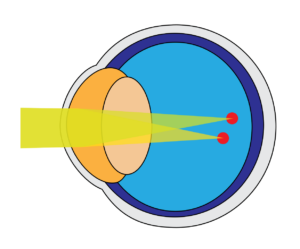
The Best Presbyopia Vitamins
Just like your bones and skin, the eyes change as they age. Even if you’ve had perfect vision your entire adult life, as a senior, things change. Presbyopia is the natural process of wear and tear on your eyes; it’s not a disease or health condition. And, it’s not the same as farsightedness.
In old age, it’s normal to experience some degree of decline in your up-close vision. The amount of decline depends on your genetics, lifestyle, and diet. If you want to limit the amount your vision is affected by age, you need to be getting all the important eye nutrients. Here are some of the most important presbyopia vitamins to take.
What Is Presbyopia?
As mentioned above, presbyopia is a natural process and not a disease. It’s a result of the eyes aging and losing elasticity in the lenses. The stiffness makes it harder to restrict the lens, a movement necessary to focus on objects up close.
In the beginning stages of presbyopia, you might notice the need to squint to read your text messages. Restaurant menus get blurrier and you start gravitating toward large-text books. Eventually, even squinting proves unhelpful in seeing things up close. This is when most people see their eye doctor and get bifocals, glasses, contact lenses, or even surgery. However, there are more natural treatment options. They start by getting specific vitamins for presbyopia.
Which Vitamins for Presbyopia Actually Work?
 There are tons of vitamins out there that are great for the body. They might even be generally beneficial for the eyes. However, some are specifically useful as vitamins for presbyopia. These are the ones you want to take as you age and when you’re a senior.
There are tons of vitamins out there that are great for the body. They might even be generally beneficial for the eyes. However, some are specifically useful as vitamins for presbyopia. These are the ones you want to take as you age and when you’re a senior.
1. Copper Gluconate
You will rarely hear of anyone being deficient in copper, but it does happen. When this happens, a person can experience anemia, vision loss, brittle bones, and a weak immune system. There are a handful of food sources that contain copper, like seafood and beans. However, if your diet restricts you from eating foods that contain copper, you could suffer from a deficiency. As someone who’s aging and already susceptible to age-related eye diseases, having a copper deficiency isn’t ideal.
Plus, copper gluconate is necessary for the body to produce collagen. Collagen is part of the connective tissues in the eye that help keep the lens flexible and agile. If you’re not getting it from your diet, talk to your doctor about taking a copper gluconate supplement as one of your vitamins for presbyopia.
2. Glutathione
The next on the list of presbyopia vitamins is glutathione. Not only does it keep the tissues in your eyes healthy, but this antioxidant is imperative in preventing age-related eye diseases. It improves the level of aqueous fluid in the eye which contributes to clear vision. It’s also responsible for keeping the lenses clear and cloud-free. Although our bodies naturally produce glutathione, they produce less as we age. This is why so many seniors develop cataracts.
One disease that contributes to declining vision in seniors is diabetic retinopathy. Glutathione is a special antioxidant in that it fights free radicals related to this disease. Since presbyopia is often accompanied by age-related eye diseases, it’s important to manage your glutathione levels as you age. It’s one of the critical vitamins for presbyopia as well as for preventing eye diseases.
3. N-Acetyl Cysteine
N-Acetyl Cysteine, also called NAC, is an essential amino acid that our eyes depend on. It’s also a source of glutathione, the nutrient discussed above. Besides ensuring your glutathione levels never drop below a healthy standard, NAC can also treat blepharitis.
Blepharitis is an eye condition that leads to irritation, redness, and inflammation. It’s caused by clogged hair follicles in the eyelash line, lack of sleep, stress, and a poor diet. NAC is used as blepharitis treatment, as well as preventing degenerative eye conditions. As you age, you become more vulnerable to degenerative diseases. It’s important to get plenty of amino acids so your eyes have sufficient protein levels.
4. Vitamin C
Visual acuity is something you usually lose when presbyopia sets in. Vitamin C, also called ascorbic acid, can slow down the progression of this loss. It’s also a powerful antioxidant that can help prevent cataracts, AMD, and other age-related diseases. Vitamin C was one of the nutrients included in a recent ARED study. This study proved the importance of specific nutrients for eye health and preventing age-related conditions, making them suitable as presbyopia vitamins.
Although taking ample amounts of these nutrients won’t cure your presbyopia, they help maintain optimal eye conditions. You could experience a slowdown in your condition’s progression. Or, if your eyes are currently healthy, it could help maintain that level of health, making it one of the best vitamins for presbyopia.
5. Vitamin A & Beta Carotene
Wondering which vitamins for presbyopia also address AMD, cataracts, glaucoma, and other age-related conditions? Besides the ones listed above, you need to be getting healthy doses of vitamin A. When it’s derived from plant sources, vitamin A starts as a carotenoid called beta carotene.
In the body, the derived vitamin A can decrease vision loss from AMD. It also prevents vision loss from retinitis pigmentosa and Stargardt disease. It’s crucial for the lubrication of your eyes and for preventing clouding in the retinas and corneal ulcers. In combination with the other ARED nutrients, vitamin A can protect the eyes from age-related vision loss.
So, Which Presbyopia Vitamins Should I Take?
Before you start taking dozens of daily supplements, assess your current diet. Are you getting some of these nutrients naturally? If you take other medications, consider talking to your doctor about the interactions between these nutrients and your medications. When you’re ready for presbyopia vitamins, make sure you choose a natural and safe option.
Presbyopia is inevitable for most of us, but you can take steps to lessen its impact. Prevent age-related vision loss before it starts by getting the right nutrients for eye health. Already experiencing presbyopia? Getting the right presbyopia vitamins now could improve the longevity of the vision you still have.
Our Rebuild Your Vision Ocu-Plus Formula Contains All 17 Vitamins, Minerals, and Herbal Supplements to Improve Your Eye Health!












I am 80 years old. My eyesight is OK except for floaters. However I wish to know ways by which I can avoid macular degeneration which is found in older people above 80 years.
Collagen loss is behind macula degeneration.
Life Extension MacuGuard with saffron
Dr Best Hyaluronic Acid (manufactured by Biocell).
Collagen supplements.
Yazdi, visit the link below to review the 7 articles that talk about natural remedies to help reduce the risk of getting macular degeneration.
https://www.rebuildyourvision.com/?s=prevent+macular+degeneration